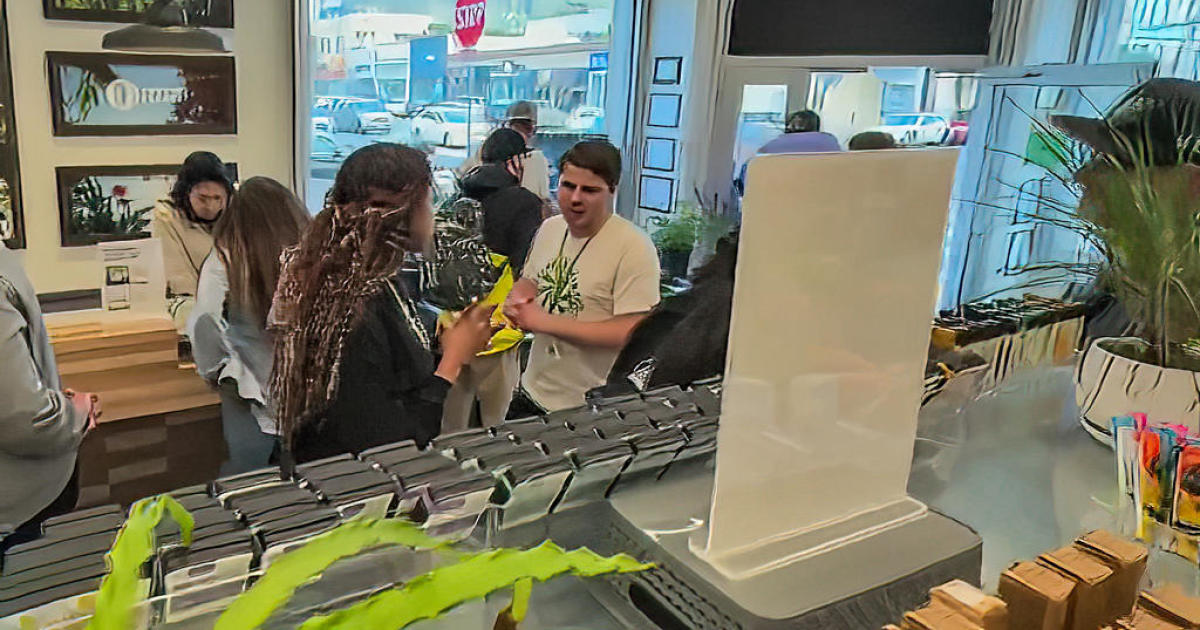Shelter-In-Place, Social Distancing Elusive For Thousands Of Bay Area Homeless During Coronavirus Pandemic
SAN FRANCISCO (KPIX 5) -- On week four of a shelter-in-place order, tens of thousands of unhoused people in the Bay Area are still unable to do so.
Marc Roth has been staying in the navigation center along San Francisco's Embarcadero where he says social distancing is impossible. He keeps reading headlines about hotels being offered to the homeless, but hasn't seen anyone from his navigation center be offered a private room.
"I keep hearing them say they're going to do the right thing. I'm just waiting for them to do what they actually say they're going to do," said Roth. "They're saying to be socially distant, but not making it possible to do so...then you've got your beds that are three inches apart, so how do you stay six feet apart from people sleeping three inches away from you?"
In a drastic change of direction, the city announced it will now start doing what homeless providers have been asking it to do for weeks, move at risk people out of congregate living spaces and into hotel rooms.
"We realize we need to think about making changes to avoid having an outbreak or situation in places like Moscone west where there are large populations of people," Mayor London Breed said Monday.
Less than one week ago, Mayor Breed announced a plan to move people in homeless shelters into Moscone West to thin out the existing shelter population. When pressed about moving the homeless into hotels more quickly the mayor said, "I know we have thousands of rooms and people are asking why don't we open the doors and let everyone in, I wish it were that easy."
RELATED: SF Ditches Plan To House Homeless At Moscone Center During Pandemic In Favor Of Hotel Rooms
"They haven't even put in barriers, I mean, they haven't even done the plastic sheeting between the beds,"said Jennifer Friedenbach, Executive Director of the Coalition on Homelessness.
"Unhoused people are really afraid...they feel like the city's killing them."
Three newly confirmed cases of COVID-19 within San Francisco shelters only added the concern providers have that the city has waited until people are sick to move them. Public health experts say individual hotel rooms are the safest option.
"I think obviously in an ideal setting, we would move everyone from shelters and encampments into private hotel rooms, that would be the best," Dr. Margot Kushel of UCSF's Center for Vulnerable Populations said.
"I think from a hotel point of view and from being able to respond, we're working as fast as we can with the city," Kevin Carroll, Executive Director of San Francisco's Hotel Council said.
The hotel industry is stepping up to help, partially because they themselves are struggling. 40 of the city's 215 hotels have temporarily closed and a majority have laid off staff. The Hotel Council of San Francisco has offered 10,000 rooms for people who cannot self isolate, though admittedly there are still a lot of questions as to how this will work.
"What does that mean for the hotel? What does that mean for staff at the hotel and what does that mean when the quarantine is over?" Carroll said.
Kushel says this population should be prioritized for testing. "I think that that would actually be a very reasonable use of limited testing resources because if someone tests negative, that they don't have the virus, we can, you know, breathe a little easier and perhaps return them to a shelter, et cetera," she said.
Breed has been at odds with the Board of Supervisors and homeless service providers on how quickly to fill the hotels. Of the 10,000 rooms offered, so far only 190 rooms are occupied by homeless guests and 945 rooms are under contract for that population. 30 rooms are occupied by first responders and 883 rooms are being held for that population, more are expected to be under contract soon.
"We don't want to be renting 3,000 rooms that sit empty for a couple of weeks," Trent Rhorer, Executive Director of the Human Services Agency said.
In the RFQ obtained by KPIX we get a glimpse into how this will work. The contracts will last a minimum of four months. There will be two categories of hotel guests, people who cannot self isolate like the homeless or people being discharged from the hospital, and first responders.
Hotel staff will care for first responders as guests, changing linens daily and cleaning their rooms but food won't be provided. The city will run the rooms meant for isolation, three daily meals will be provided but cleaning services will not be. Security guards will be present at the hotels for the homeless.
"The resources in general needed to provide wrap-around supportive services for many of these populations make it difficult to just open the doors and allow anyone to walk in," Breed said.
"I think the city is moving way too slowly," Friedenbach said.
Providers like the Coalition on Homelsesness want to be involved, they're asking the city to let them help run these hotels, which is something the city of Oakland has already done, Abode Services is operating two hotels in Oakland that will house the homeless during this time.
"If we do it in partnership, we can get it done, it's not going to be perfect, but we don't have time for perfection," Friedenbach said.
"This is a real opportunity to take advantage of what's going on and build a real solution and it's all talk, no action," Roth said.
Roth has moved into an SRO he says he feels safe there despite some shared living spaces including his bathroom. He says the hotel rooms need to go to the most vulnerable homeless residents who are on the street and in shelters right now.



